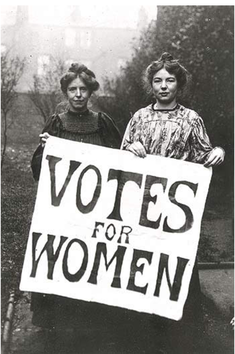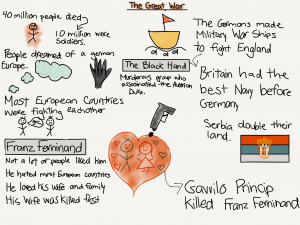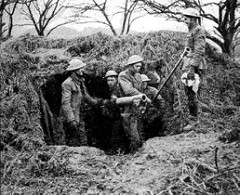In my first unit of Humanities 10, we have been working on different parts of World War I. When beginning this course, I thought that it would be near impossible to learn about an entire war in only two months. I was proven wrong.
To introduce my class to such an extreme topic, my teacher started with a small task. She asked us to read a 34 slide presentation about the Laurier Era, splitting us into 5 groups to complete a keynote presentation. My group was given the “French and English tensions in the Laurier Era” topic to base our presentation off of. I learned facts about the French Canadians and English Canadians that surprised me. These two groups fought over everything from which language would be spoken in schools to whether Canada should send soldiers to fight in WWI or not. These arguments made Wilfred Laurier have to deal with very difficult decisions, which no matter what would make one side angry. In the end, this fighting is what ended the Laurier Era and resulted in Canada gaining a new Prime Minister.
After this assignment, my class had to research the Struggle for Human Rights during the Laurier Era. I learned that while the French Canadians and English Canadians were fighting, women and aboriginal citizens living in Canada were not being treated fairly. These two groups were not given the same rights and opportunities as other Canadians because they were seen as visual minorities. I found out that women were not allowed to vote or receive an education which restricted them to only be stay-at-home-moms. This really impacted me because if the laws were the same right now, I would be denied an education and a chance to make something of myself.
Aboriginal citizens, on the other hand, were stripped of their culture and heritage by being put in residential schools. I found out that children were taken away from their families and were forced to forget their culture. This was a horrible part of Canadas history and I think that it is something that we should always remember, never forgetting the Canadians that went through this.
After learning about the Laurier Era, my teacher asked my class to make a collage of different aspects of the beginning of WWI and what happened to create hatred between the countries involved. After listening to a video that was based on facts of why World War I began, we had to make a collage that consisted of facts, notes, and illustrations to represent them.
After this mini-project we looked deeper into the begging of World War I by creating opinions of the cause. We read a slide show that explored different opinions and explanations for the cause of World War I. This included the killing of Franz Ferdinand and the fight over having the best war technology.
Now came the hard part, we had to take this information and deside why World War I started. Once we came up with a thesis, we joined groups to create a video to represent our thesises.
That video was a great way of showing our knowledge through visual representation. Although that is a great skill to have, making a podcast is a bigger challenge, which is exactly what we did next. My teacher gave my class a podcast exercise where we were given individual scripts to record ourselves reading. Once everyone recorded their parts, we put them together to make one podcast. This gave us the skills of controlling volume and tone in our scripts so that our next podcast would have better quality.
Now that that project was over, it was time to move further into the war by researching spacific soldiers that participated. By going on a website, my class took the time to look at different soldiers and try to find ones that have heroic stories that tie to the driving question, how did WWI effect Canadas identity. This is a big question to answer, so the first thing I had to think about was how Canada changed after the World War I. After researching this topic, I found out that Canada was not considered a separate country before the war, creating their independence while fighting. This brought me to thinking about how Canada created their independence and formed an identity. Was it because of the brave and strong soldiers who fought in World War I?
After finding a soldier, named Armine Frank Norris, I came to the conclusion that soldiers like Armine were the main factors that effected the change in Canada. I was very excited to share the unique story of this soldier, and to tell anyone who would listen what a hero he was. I had an attachment to this soldier from the start, mainly because we share the same last name, but also because of his interests in school. This project had multiple drafts that included changes in music, speed, and story perspectives.
My first draft was too boring to listen to because it sounded like I was reading from a script instead of relating to the audience and asking questions. I also made music with the strings on Garage Band, which is the easiest thing to do instead of making mine unique. Once I got feedback from one of my classmates, I decided that it was time to make my second draft.
While creating my second and final draft to submit to my teacher, I changed a lot of ideas. For starters, I shortened my introduction to keep my audience engaged from the start. I changed the music to be more complex and interesting by using a piano and my voice in the background, which made it more personal. I also created a new beginning of the podcast by giving the audience something to connect to. I talked about how old my soldier was and what he gave up to fight in World War I. Now that there was an emotional connection to my soldier, it would make the audience want to find out what happened to him. Was he a hero in the war? Did he make it through the war? Were his contributions significant enough to change Canada and its identity? All of these questions and more can be answered by listening to my podcast which tells the story of Armine Frank Norris.
Whew! I was completely wrong, you can learn about an entire war in only two months. I learned not only about the war, but also the Laurier Era, the Struggle for Human Rights, and specific soldiers fighting in the war. I understand the heartbreak that the soldiers and their families went through as well as the change in roles back in Canada while this war was taking place. I’m very proud of Canada and how it’s identity changed after the war, making it a strong and independent country.





Leave a Reply